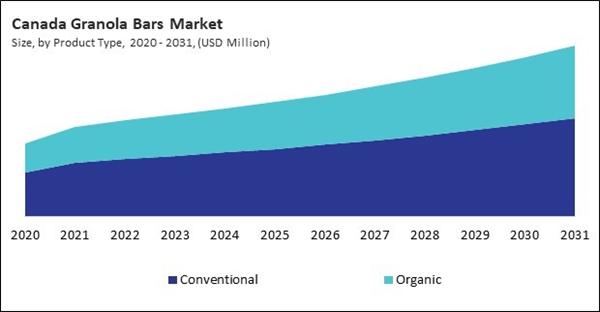Conventional granola bars are crafted using a blend of ingredients such as oats, nuts, seeds, dried fruits, and sweeteners, providing a convenient and satisfying snack option for on-the-go consumption. This segment encompasses traditional flavors like oats and honey, as well as innovative varieties incorporating chocolate chips, peanut butter, or coconut. Conventional granola bars often prioritize affordability and accessibility, appealing to a broad demographic of consumers seeking convenient and familiar snack options. Consequently, Canada market would consume 21.1 million units of Conventional granola bars by the year 2031.
The US market dominated the North America Granola Bars Market by Country in 2023; thereby, achieving a market value of$2.27 billion by 2031. The Canada market is experiencing a CAGR of 6.8% during (2024 - 2031). Additionally, The Mexico market would exhibit a CAGR of 6.4% during (2024 - 2031).
The granola bars market refers to the industry segment that produces, distributes, and sells granola bars. Granola bars are convenient, ready-to-eat snack bars made primarily from ingredients such as oats, nuts, seeds, dried fruits, and sweeteners. They are typically processed by baking or pressing the ingredients together into a compact, portable form, making them suitable for on-the-go consumption.
In addition, granola bars find extensive applications across various segments of the food industry, catering to diverse consumer needs and preferences. Granola bars fortified with protein sources, such as nuts, seeds, pea protein, or whey protein isolate, cater to consumers seeking snacks that boost muscle repair, satiety, and energy metabolism. Granola bars incorporating functional ingredients, such as superfoods (e.g., chia seeds, quinoa, goji berries), adaptogens (e.g., ashwagandha, rhodiola), and prebiotics/probiotics, offer targeted health benefits and address specific wellness concerns, such as stress relief, immune support, and digestive health.
As the food processing industry in Mexico continues to grow, there is an increased capacity for the manufacturing and production of granola bars. Mexican food processing companies have invested in modern facilities, technology, and equipment to produce high-quality granola bars efficiently and at scale. This increased production capacity has led to more granola bar brands and flavors, catering to diverse consumer preferences and tastes. The food processing industry was one of the most dynamic in Mexico, according to the US Department of Agriculture, with an average annual growth rate of 4.3% and a predicted GDP contribution to Mexico's economy of $39.4 billion in 2020. Thus, the expansion of the e-commerce sector and increasing food processing propelled the market’s growth.
Based on Product Type, the market is segmented into Conventional, and Organic. Based on Distribution Channel, the market is segmented into Supermarket & Hypermarket, Departmental Stores, Convenience Stores, Online Sales Channel, and Others. Based on countries, the market is segmented into U.S., Mexico, Canada, and Rest of North America.
List of Key Companies Profiled
- The Hershey Company
- Mars, Inc.
- General Mills, Inc.
- Kellogg Company
- PepsiCo, Inc.
- John B. Sanfilippo & Son, Inc.
- Clif Bar & Company
- Nestle S.A.
- McKee Foods Corporation
- Olympia Granola
Market Report Segmentation
By Product Type (Volume, Million Units (Pack of 6), USD Billion, 2020-2031)
- Conventional
- Organic
By Distribution Channel (Volume, Million Units (Pack of 6), USD Billion, 2020-2031)
- Supermarket & Hypermarket
- Departmental Stores
- Convenience Stores
- Online Sales Channel
- Others
By Country (Volume, Million Units (Pack of 6), USD Billion, 2020-2031)
- US
- Canada
- Mexico
- Rest of North America
Table of Contents
Companies Mentioned
- The Hershey Company
- Mars, Inc.
- General Mills, Inc.
- Kellogg Company
- PepsiCo, Inc.
- John B. Sanfilippo & Son, Inc.
- Clif Bar & Company
- Nestle S.A.
- McKee Foods Corporation
- Olympia Granola









